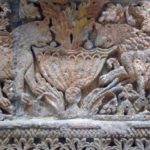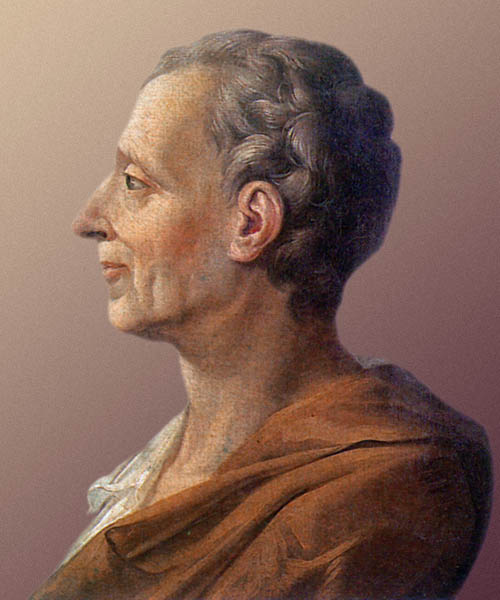
Modernity with its rotation of power and direction of the state is carried out through institutions rather than through the will of an individual - hence the importance of the independence of he executive, legislative and judicial institutions. This is what Montesquieu and John Lock were calling for in the 17th century, along with absolute freedom to be accorded to scientific research and intellectual creativity, and freedom against any form of controls.
MODERNITY DOES NOT recognise the phrase: ‘this scientific research or this thinking is contrary to the fundamentals of the state’. That is because modernity stands against any fixed certainties which may hinder progress, as demonstrated when Europe surpassed the philosophies and the sciences of Ancient Greece with the work of Copernicus, Galileo, Giordano Bruno and the like, and this despite the fact that the trajectory of Europe – in its sciences, philosophy and language – is a continuation of Greco-Roman culture.
If we apply these bases to Arab culture we find that there is a relationship of opposition and repulsion. In Arab culture rule was on the basis of the individual person of the ruler who wielded absolute power – a caliph or a sultan or, in the modern period, figures such as Abd al-Nasir, Saddam Hussein and Qaddhafi, who took the name of President whether in monarchical or republican systems, while practising the worst forms of dictatorship, just as the Muslim caliphs did. The elimination of all rivals in modern Arab regimes is simply an extension of what Muslim caliphs practised. An example of this is the massacre carried out by the Abbasids against the Umayyads, where after the death of Abū al-ʽAbbās al-Saffāh and the coming to power of Abū Ja’far al-Mansūr, his uncle ‘Abd Allāh ibn ‘Alī claimed the caliphate in place of al-Mansūr, upon which al-Mansūr had him killed. Afterwards, Abū Muslim al-Khurasānī rebelled against al-Mansūr and was similarly slain.
Modernity stands against any fixed certainties which may hinder progress
What is most disfiguring is that the Abbasids began their reign by desecrating the graves of the Umayyad caliphs and finishing off their surviving remnants in an appalling massacre. They disinterred the corpse of Hishām ibn ‘Abd al-Malik, crucified it, scourged it and then had it burnt. But the act of vendetta founded upon the mentality of shepherds did not stop there. Abū al-ʽAbbās promised Sulaymān the son of Hishām ibn ‘Abd al-Malik, along with a number of grandees of the Umayyad clan and invited them to a banquet. Into their presence came the poet Sudayf who intoned to the caliph:
Do not be fooled by the men here arrayed,
For they each bear within them a festering sore;
Raise the whip and unsheathe the blade,
Till you see an Umayyad no more.
Upon which al-Saffāh (or according to others his uncle ‘Abd Allāh ibn ‘Alī) ordered them to be beaten until they died of their severe tortures.
Ibn Kathīr in his work Al-Bidāya wal-Nihāya writes that ‘Abd Allāh ibn ‘Alī pursued the Umayyad sons of the caliphs and others and in one-day slew 72,000 men, after which he spread over them skin hides and sat upon a carpet over them, eating while all the time listening to their groans. Al-Suyūtī in his History of the Caliphs states that ‘after he finished his meal he declared: “I never ate such fine food!”’. Following al-Saffāh there came to power his brother Abū Ja’far al-Mansūr the real founder of the Abbasid caliphate. He inaugurated his caliphate with the killing of his uncle ‘Abd Allāh ibn ‘Alī out of fear that his rule would be challenged. After which he turned on Abū Muslim and likewise had him killed. When he beseeched him with the words: “Spare me, O Commander of the Faithful so that I may fight thy enemies” al-Mansūr said to him: “which enemy is more inimical than thee?”
If massacres of Arab peoples have taken place in the present era (in Libya, Yemen and Syria), we find that is was Muslims killing Muslims like themselves. All this is a natural extension of Arab history. The inhabitants of Medina, for example, rebelled against Yazīd ibn al-Muʽāwiya, whereupon Yazīd dispatched an army under the command of Muslim ibn ‘Uqba to punish the Madinans, whom he duly defeated at the battle of al-Harra. The (Muslim) commander then issued an order granting the Muslim army free rein, for three whole days, over Medina the city of the Prophet Muhammad. Historians recount that a total of 4,500 Muslims were killed at the hands of Muslims like themselves and a total of 1,000 maidens were robbed of their maidenhood.
The elimination of rivals in modern Arab regimes is an extension of what Muslim caliphs practised
Following this, the commander Muslim ibn ‘Uqba forced the Muslim survivors in the city to pledge their allegiance and their servitude to Yazīd. Those who refused were killed. When news of this incident reached the Muslim caliph Yazīd he recited some verses of poetry in which he expressed regret that his ancestors who were killed in the Badr raid were not alive to see what he had done to the family of the house of Muhammad. Al-Tabarī[1] and Yāqūt al-Hamawī record that in this incident there were slain 1,700 Ansār, 1,300 Muhājirūn and 500 Mawālī, and thousands of maidens were deflowered. So it is hardly surprising that under this bloody legacy the Kaʽba Itself should have been bombarded by catapults. At this clash between the army of ‘Abd Allāh ibn Zubayr and al-Hajjāj ibn Yūsuf during the era of ‘Abd al-Malik ibn Marwān, the head of ‘Abd Allāh ibn Zubayr was cut off and his body crucified.

Suggested Reading
Whenever, in our own age, religious institutions subservient to Arab regimes issue fatwas in support of the ruler, this itself is an extension of the Arab heritage. For when Yazīd the son of ‘Abd al-Malik ibn Marwān acceded to the caliphate, fourteen religious scholars in Damascus issued fatwas declaring that “the caliphs are unaccountable and exempt from punishment in the Hereafter”, The poet Ibn Hāni’ al-Andalusī even attributed divine status and prophethood to the caliphs. Concerning the Fatimid al-Muʽizz li-Dīn Allāh he wrote:
He is the cause of this world, for whom was light made,
For ever so long as things have stayed;
Seek not to ask of Age or Time, safe in thy hands its order awaits;
Thy will is what counts, not the will of the Fates.
Rule as thou wilt, since thou art the sole conqueror,
It is as if thou art the Prophet Muhammad, and thy allies the Ansār.
When ‘Uthmān ibn ‘Affān acceded to the caliphate he appointed his relatives as rulers over the lands raided and occupied. Among these was al-Walīd ibn ‘Uqba ibn Abīū Muʽīt. We should note that the father of ‘Uqba was one of the staunchest enemies of the Prophet, and for which reason the Prophet had him killed. Before his death he asked the Prophet: “If you kill me, who will look after my little ones?” to which the Prophet replied: “To Hell with them!” During the many conflicts that took place between Islamic sects, harbingers of paradise preached against other harbingers of paradise, and one set of Companions fought against another.
Arab peoples will never become free until they dispense with this heritage
Muslims fought against Muslims, believers assassinated believers like themselves, their pretext being apostasy from the Islamic faith, for which they adduced as witness the Prophetic hadith whereby Muhammad is to have said: “He who changes his faith: kill him.” The embracing of the Islamic faith in this heritage is not left to the freedom of the individual in any of these societies, and anyone who refuses Islam has to be killed, in fulfilment of the Prophet Muhammad’s hadith:
I have been commanded to fight people until they say: ‘There is no God save Allah’ and until they pray and give Zakāh – if they do thus their blood and wealth are safe from me.[2]
The denigration of woman in this heritage comes as an extension of Muhammad’s hadith:
Should a man summon his woman to his bed and she fails to oblige, the angels will send curses upon her until she does
And in the two Sahīh collections of Hadith there is:
Should the woman refuse and shun her husband’s bed and refuse his demand, the One in heaven will be angered with her until her husband is satisfied by her[3]
In another hadith there is the passage:
Should a man summon his woman to his bed, she must oblige, even if this be on the back of a mount
– which some doctors of law have mitigated thus: “except if she be excused on account of menses or parturition.” The imam Shams al-Dīn al-Dhahabī, considered by many to be the authoritative historian of Islam, wrote:
It behoves a woman to understand that she is like a slave-woman to her husband and that she is not to behave according to her own wishes.[4]
The degeneration of the opinion on women in Arab Islamic culture reaches to the point of belief in the following hadith of Muhammad:
If I were to command anyone to prostrate in prayer before another human being, I would command a woman to prostrate herself before her husband.
The hadith is quoted by Abū Hurayra, who cites as evidence the hadith[5] narrated by ‘Ā’isha the wife of the Prophet whereby the Prophet said:
If a woman leaves her husband’s house the angels will curse her until she returns or repents of her action.
Should she, however, meet his approval, then there is another hadith that runs:
Whenever a woman dies while her husband is happy with her, she will enter unto paradise.[6]
This is an anti-rational heritage, and one that is inimical to modernity. The successors to this heritage still repeat the following hadith:
The birds in the sky, the fish in the sea, the angels in heaven, the sun and the moon all express forgivenness to a woman for as long as her husband is contented with her
– that is, on the basis of her obedience to her husband. But is she thus a human being? The answer comes from a hadith that outright strips her of her status as a human:
Woman is a pudendum; if she departs her house Satan is watching; since woman is a pudendum, conceal her in the home.[7]
If we add to all this the standpoint of opposition to the natural sciences (on the basis that these are contrary to the Islamic Sharīʻa) or opposition to any creative freedom, as represented by the killing of those who oppose this heritage, such as Ibn al-Muqaffaʽ and al-Suhrawardī, we can see that what took place in the distant past is occurring lock stock and barrel in Arab states here and now in the third millenium. Whenever a free mind undertakes a sincere reading of the books of Arab Islamic history, it comes to the conclusion that the Arab Islamic heritage is one that is anti-modern, and that Arab peoples will never become free until they dispense with this heritage outright.
[1] Histories, Vol. II p.45.
[2] A strong hadith recorded in most Hadith collections, which are the sources of Arab and Muslim pride even to this day.
[3] Sahīh Muslim and Sahīh al-Bukhārī and also al-Nisā’ī.
[4] Kitāb al-Kabā’ir, Dār al-Ghad al-ʽArabī, 189.
[5] Recorded in the collections by Ibn Māja and Qays ibn Saʽīd and Abū Dā’ūd and Ibn Habbān and Maʽādh in al-Hākim’s book on al-Targhīb, and related by al-Tirmidhī.
[6] Related by Ibn Māja and al-Tirmidhī.
[7] Ibid. pp.190-191.


